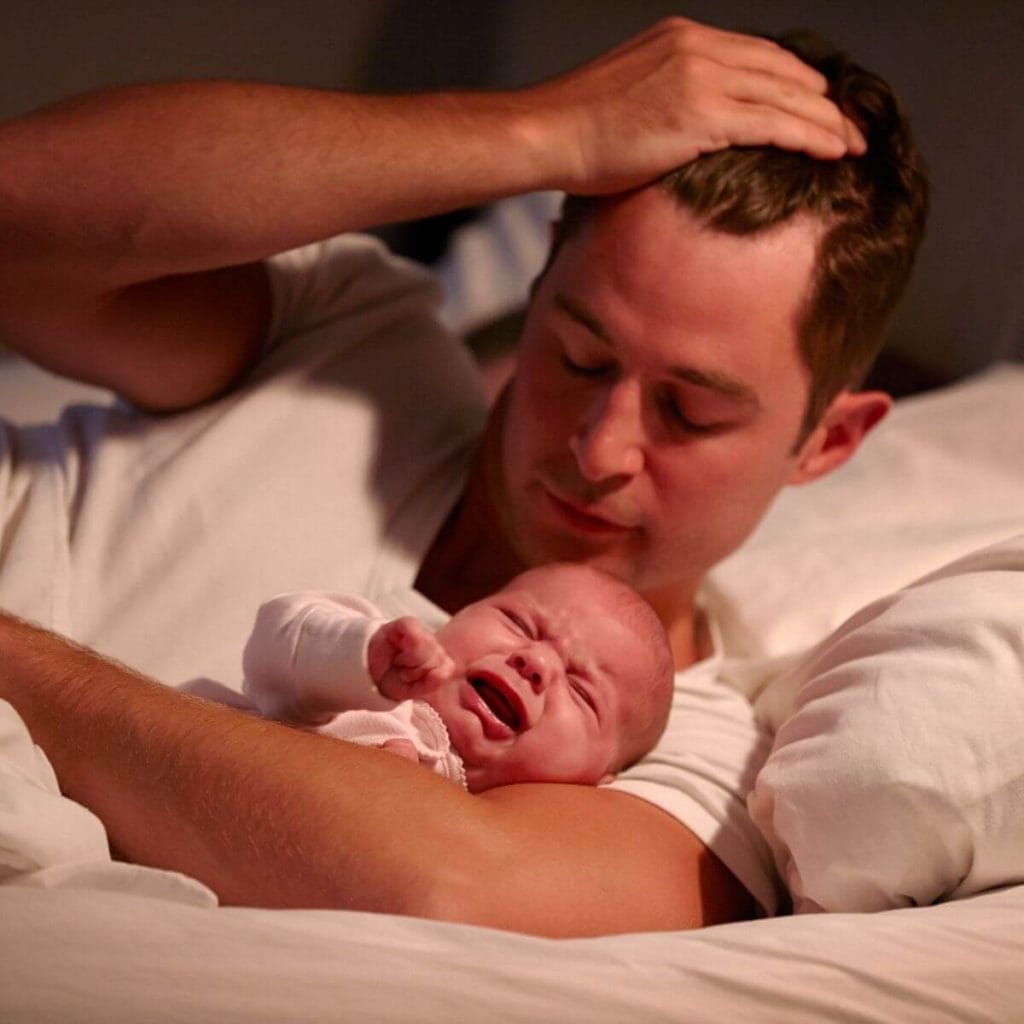The simplest of tasks can require a monumental effort when you’re caring for a newborn and recovering postpartum. As a new mom, a trip to the pediatrician’s office can seem like a full day event when you’ve never changed a diaper in a public bathroom; you’re not experienced using the car seat or stroller; and you don’t know how your baby will react to the new environment.
Throw in some anxiety over your child getting their first set of recommended vaccines at just 2 months, and you’ve got one stressed-out Mama!
In this article, I hope to alleviate some of these fears by walking you through what to expect after 2 month shots are given to your baby.

This site contains affiliate links, meaning that we earn a small commission for purchases made through our site. We only recommend products we personally use, love, or have thoroughly vetted.
It’s Okay to Be Nervous, Mama! We have answers to your 2 Month Shots questions!
I consider myself a pretty calm, unflappable individual, but when it came to my son and the 2 month vaccines, I was much less confident in how I would handle watching my baby suffer.
I remember one day I had a revelation that at some point in his life he would likely experience getting stung by a bee or have a sunburn. This thought sent me into an ugly crying fit in the street outside my house in front of my neighbors. Thank you, postpartum hormones.
If you’re nervous about seeing your baby in pain, I totally get it and I am here for you, but also keep in mind how necessary these shots are to protect your baby.
As a former epidemiologist, I am certain vaccines are well worth the stress and sleep deprivation.
Vaccines save the lives of infants every day, and it’s one of the best things you can do to protect your baby from deadly disease like measles, pertussis (whooping cough), or bacterial pneumonia.
Here are answers to commonly asked questions that will help you get through the big event:
1. How many and What shots do babies get at 2 months?
The total number of actual pokes your infant will receive may vary based on the brand of vaccines your pediatrician uses, but here’s a general rundown of vaccines your baby will receive at their two month appointment:
Hepatitis B
Your child likely already received their first dose of this vaccine at birth. This vaccine is often combined with the DTaP and the inactivated polio vaccine, a combination vaccine known as Pediarix.
Combination vaccines reduce the number of times your baby has to get poked by a needle (yay!), and like individual vaccines, they are rigorously tested to make sure they are safe.
If Mom was positive for Hepatitis B during her pregnancy, her infant should receive this vaccine at the 1 month mark and adhere strictly to the vaccine schedule provided by her doctor since the baby is at much higher risk for this disease.
Rotavirus
This is actually an oral vaccine–no shots needed! Pediatricians give this vaccine to your baby in a liquid-filled syringe that is administered by mouth.
Diptheria, Tetanus, Pertussis
The reason you receive a Pertussis, AKA TdaP vaccine during pregnancy is so you can pass on immune factors that prevent Pertussis to your newborn while they’re still too young for the vaccine. Unfortunately, these immune factors quickly disappear after about 6 weeks, so it’s important that 2-month olds receive a Pertussis vaccine.
This vaccine is offered in combination with other vaccines listed here.
Pertussis is a terrible disease for babies, causing long, barking coughing fits. Some babies even turn blue due to lack of oxygen. About 50% of babies who get pertussis (whooping cough) require hospitalization and about 1% will die.
H. influenzae
One of the lesser known childhood illnesses, “H. flu” is a bacterial baddie that causes meningitis, pneumonia, and bacterial infections of the bloodstream.
This vaccine prevents influenzas Type B, the strain that results in the most severe infections. You might hear it referred to as the “HIB” vaccine.
Pneumococcal
This vaccine protects against 13 different types of invasive bacteria or bacteria that can get into places where you really don’t want bacteria to be, such as your internal organs and tissues, or your bloodstream.
Polio
I think we are all familiar with Polio thanks to dramatizations of the disease in popular culture, but the real compelling story is the eradication of polio thanks to mass public health vaccine campaigns.
This vaccine is routinely combined with other vaccines.
Overall, this list equates to approximately two to three shots depending on your child’s pediatrician.

2. 2 Month Shots: Baby Vaccines; How do I schedule and what if I want to wait?
From years of professional conversations with pediatricians, I know practices don’t love giving shots anymore than kids like getting them.
Most doctors do try to provide the lowest number of shots possible within the vaccine schedule.
Any evidence-based pediatrician worth their salt will adhere to the Advisory Committee on Immunization Practice’s (ACIP) childhood vaccine schedule, but your pediatrician may recommend altering a vaccine schedule if your child has a weakened immune system, or if your child is in a higher risk situation for certain diseases.
If you are concerned about what to expect after 2 month shots, sit down with your pediatrician or their nurse and talk through your fears and what you can do to help baby after they receive their shots.
The 2 Month Vaccine Schedule
I have a decade of experience in public health, and I was confident with my first baby that I would be getting his vaccines right on schedule.
I have seen first hand how much vaccine-preventable childhood illnesses can impact families physically, emotionally, and even financially.
Pediatricians do not recommend that you spread out immunizations to reduce the number of shots your baby gets at one appointment. This can leave your baby vulnerable to dangerous disease longer than necessary.
3. What questions should I ask my pediatrician about 2 Month Old Shots
If this is your first child, you are probably still developing a solid doctor-patient relationship with your pediatrician. It can be really intimidating to have a conversation with a doctor when you don’t know the medical terminology or have the confidence in your own parenting to speak up for yourself and your needs.
You might also lack the brain cells (hello, sleepless nights) to form complete sentences.
Tick through the list of questions below to spark some meaningful dialogue with your pediatrician about what to expect after 2 months shots:
- How many shots will my baby receive today?
- What can I expect in terms of side effects from the vaccines? When might the side effects start? Will they ever end?
- When is a fever high for an infant?
- Do you have an after-hours line, and when do I need to call? When do I need to go to an emergency room?
- Can I give my infant any brand of pain-relieving medication? Do you have information on how to offer the appropriate dose for my baby’s age or weight?
- I am planning to travel with my infant. What other vaccines might we need? (Provide destinations and dates of travel.)
- When do I need to schedule my next appointment? What vaccines will my baby receive at the next appointment?

4. How Do I Deal with the Stress of Watching Baby Get Their 2 Month Shots
First, I want you to know your emotions regarding your baby are completely valid, and however they manifest themselves, you do not owe anyone an apology for your tears, your worries, or your need for more information.
Most nurses or doctors, unless they are fresh out of school, have likely vaccinated many children, and they will know better than anyone how to make vaccination quick and efficient.
Most of my son’s vaccines were over in less than a minute regardless of the technician who administered them.
The scary part happened so fast that before I could even get upset, I was already shifting my focus on cuddling and soothing him in my arms.
The anticipation and build-up to your child’s first vaccines is truly much worse than the actual appointment. Luckily, this is one of those experiences that will likely get easier as you come to see how resilient children can be.
Side Effects of 2 Month Vaccines
5. What are the typical side effects of 2 Month Vaccines?
When wondering what to expect after 2 month shots, you’re likely very concerned about how this will affect your baby after you leave the pediatrician’s office.
Temporary soreness and swelling at the injection site is a common side effect of most vaccines.
You’ve probably experienced this yourself. Your baby may not be able to tell you that the injection site is sore, but they may favor a certain side of their body when nursing, feeding, or playing.
In 3-5% of babies vaccinated with the DTaP vaccine, parents reported a fever of 101 degrees Fahrenheit or higher.
In addition, the rotavirus vaccine is considered a “live vaccine,” which means that a component of the vaccine is weakened rotavirus.
Thus, it may cause some very mild symptoms similar to a rotavirus-infection. This includes fussiness or irritability as well as mild diarrhea and possibly some vomiting.
That’s still way better than actually getting rotavirus, which can be fatal in newborns.
It’s difficult to know exactly when side effects from a vaccine end as newborns are notoriously unpredictable creatures with sudden growth spurts, reflux, and sleep consolidation happening throughout the first three months.
Will baby get a fever after 2-month Shots?
Fevers below 104℉ are common after the 2-month DTap vaccine. One-quarter of babies who receive the vaccine experience a fever. In 3-5% of babies vaccinated with the DTaP vaccine, parents reported a fever of 101 degrees Fahrenheit or higher.
How long are babies fussy after 2 month shots?
It’s difficult to know exactly when side effects from a vaccine end as newborns are notoriously unpredictable creatures with sudden growth spurts, reflux, and sleep consolidation happening throughout the first three months.
Babies may continue to be fussy for some time. A healthy baby is alert, regularly wetting their diapers, and showing improvements in their appetite following vaccination.
Any local reaction like swelling near the injection site clears up in a week. Expect fevers to resolve within 24 hours. If symptoms don’t resolve on their own or if you notice symptoms worsening, call your pediatrician. Call your pediatrician immediately if you notice your baby breathing fast or having difficulty breathing.
I Wish I Had Known What to Expect After 2 Month Vaccines
In my personal experience, it took a full 7 days for my son to get back to what I would consider “normal,” but it could take your child a few days.
Our son had some of the worst fussiness and daytime and nighttime sleep I’d ever seen immediately after these vaccines.
About a week in, he suddenly started sleeping longer stretches at night and crying less during the day. He was probably in the middle of some sort of developmental change in addition to fussiness from getting vaccinated.
Ah, the newborn days!
If you feel like the side effects of the vaccine have not subsided or are getting worse after 2-3 days, it might be time to call your pediatrician for advice.
After Care: How to Soothe Your Baby After 2 Month Vaccines
Fussiness and crying are our babies’ only way of urgently communicating how they are feeling and what they need.
If your baby is feeling under the weather following their first vaccines, you can bet there will be a lot of both.
You may feel exhausted, drained, and incredulous as to who replaced your sweet, happy child with this cranky poop monster.
I did what I would consider my most hardcore mothering during this time, and interestingly, that involved a lot of coffee, Netflix and HBO. Hey, you gotta do what you gotta do.

Try These Field-Tested Strategies
- Medications. Don’t be afraid to offer pediatrician-approved medications, especially the first day or two when inflammation near the injection site is at its worst. Make sure you’ve asked your pediatrician about the appropriate dosage and frequency of use.
- A warm soak in the tub. Remove the bandage in warm water during bath time or even better, take a nice warm soak with your infant. Make sure a partner is around to help you and baby get in and out of the bathtub.
- Skin to Skin. For babies who lose their appetite, offer skin to skin contact with your baby while nursing or bottle feeding to help them relax.
- Snacks and cuddles. Stock up on hand-held foods (looking at you, Uncrustables) or have your partner handy for bringing you snacks as you cuddle, hold, and nurse or bottle feed your baby through a very difficult (but short!) time.
- Settle in and rest. Grab a pair of postpartum pajamas and plan to spend most of the day resting with your baby. This may include listening to a podcast, reading a book one-handed on your Kindle, or in my case, watching the entire run of Big Little Lies. You do you.
- Sleep support. Offer additional support during naps and nighttime wakings. Whatever your approach to infant sleep, an infant who’s not feeling well is not going to sleep well. My policy is prioritizing sleep during illness over any gradual sleep goals we’re working towards.
- Monitor for warning signs. Check your baby’s temperature once or twice a day or as you suspect they are running a fever. Make note of any weird bowel movements, rashes, or anything else unusual in case you need to call the pediatrician or report an adverse side effect.
According to the Centers for Disease Control and Prevention, if you see signs of a possible allergic reaction after your child is vaccinated, such as hives, swelling of the face and throat, and weakness, call 9-1-1 right away.
If your child is refusing to eat at multiple feedings, has fewer wet diapers or other signs of dehydration, develops a rash, cries inconsolably for three or more hours, or has sustained high fever of 100.4 degrees Fahrenheit or higher for multiple days in a row following a vaccine, you want to call your doctor right away.
Feel Confident You Know What to Expect After 2 Month Shots and Why They’re So Important
It’s our job as parents to protect our young children from unnecessary illness, health conditions, and disability, and getting your child’s two month vaccines is the perfect place to start!
I know it can be overwhelming think of replacing your sweet 2 month old with a vaccinated fuss monster, but knowing what to expect before and after your child receives their vaccines can help a ton.
What practical tips do you have for first time moms who don’t know what to expect after 2 month shots?










